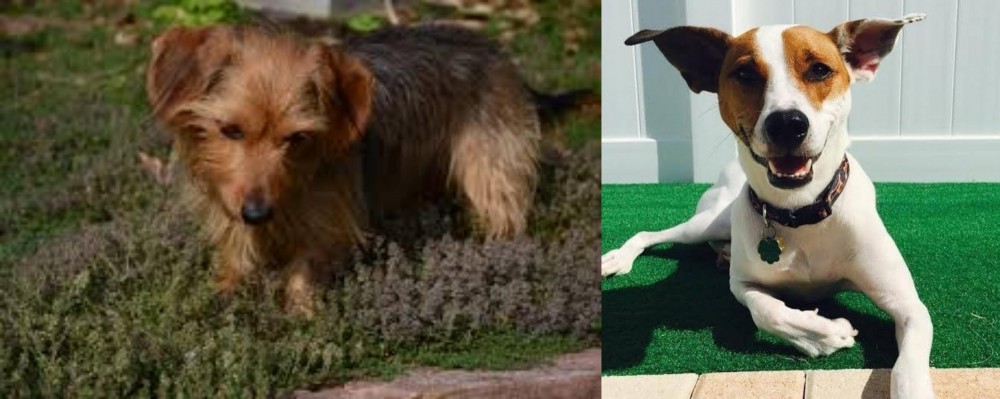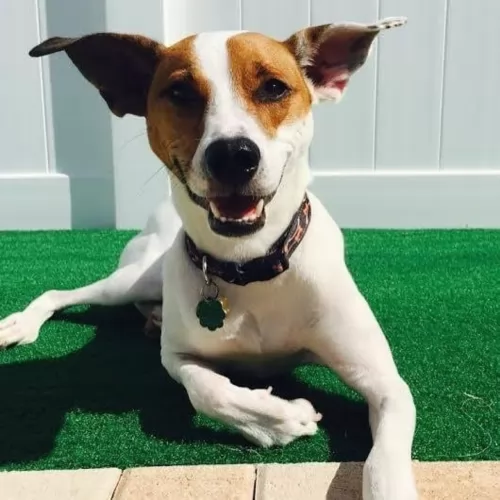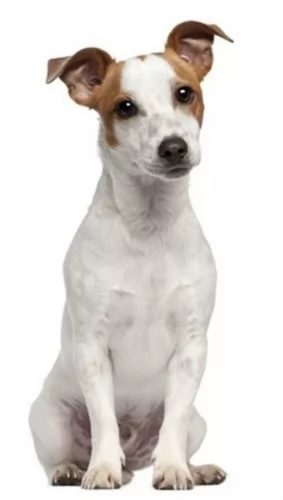 Petzlover
Petzlover Both Dorkie and Feist are originated from United States. Dorkie may grow 33 cm / 12 inches shorter than Feist. Dorkie may weigh 9 kg / 19 pounds lesser than Feist. Dorkie may live 5 years less than Feist. Both Dorkie and Feist has almost same litter size. Both Dorkie and Feist requires Low Maintenance.
Both Dorkie and Feist are originated from United States. Dorkie may grow 33 cm / 12 inches shorter than Feist. Dorkie may weigh 9 kg / 19 pounds lesser than Feist. Dorkie may live 5 years less than Feist. Both Dorkie and Feist has almost same litter size. Both Dorkie and Feist requires Low Maintenance.
 Dorkie Terriers originate from the United States of America. The small Dorkie, a cross between the Dachshund and the Yorkshire Terrier has a short history, unlike the two dog breeds that were bred to bring him about.
Dorkie Terriers originate from the United States of America. The small Dorkie, a cross between the Dachshund and the Yorkshire Terrier has a short history, unlike the two dog breeds that were bred to bring him about.
These dog breeds were both used for hunting small animals but the Dorkie today is essentially a companion dog. The International Designer Canine Association started recording registration of the Dorkie from 2009.
 The Feist is a small dog from the United States, coming from Terrier dogs which were brought over to the States. It is believed that these Terriers included crosses between several terriers – the Manchester Terriers, Smooth Fox Terrier and English White Terrier – dogs used as ratters and known for their skills in killing rats.
The Feist is a small dog from the United States, coming from Terrier dogs which were brought over to the States. It is believed that these Terriers included crosses between several terriers – the Manchester Terriers, Smooth Fox Terrier and English White Terrier – dogs used as ratters and known for their skills in killing rats.
The Feist isn’t a new type of dog and in fact there are records of the dog which go back centuries. George Washington even referred to them in 1770 already, and the breed was popularized by President Teddy Roosevelt, who hunted with his Feist.
 The Dorkie is a small hybrid breed standing at 13 – 23cm in height and weighing 2 – 6kg. The Dorkie mostly comes with long, straight hair but there are however Dorkies who have the short hair of the Dachshund.
The Dorkie is a small hybrid breed standing at 13 – 23cm in height and weighing 2 – 6kg. The Dorkie mostly comes with long, straight hair but there are however Dorkies who have the short hair of the Dachshund.
The Dorkie is hypoallergenic, making them the ideal pet for allergy sufferers. They have floppy ears, a long body and short legs. The tail is long and furry. Most times they come in the Yorkshire Terrier colors of black and tan, but this can also vary.
The Dorkie is a loving, loyal, happy little dog who makes an excellent family dog. Although he isn’t looked upon as your typical lap dog, it is what he is really, as he loves nothing more than to be curling up on your lap or as close to you as he can get.
He loves spending time with his human family and is a social, extrovert kind of dog. Because he is also alert, he will do a good job of alerting his family to danger. He is good with children, but because of his smallness, rough children will need to be careful in rough and tumble games as he could get injured.
Even with a small dog like this, he will need training and socialization otherwise he can become a yapper, which comes from the Dachshund side. Training makes him obedient and relaxed around visitors in the home, and because he is an intelligent breed, he is easy to train and is a great dog for first time dog owners.
 Standing at about 46cm to 56cm in height and weighing in the region of 10 to 15kg, the Feist is a short haired dog that doesn’t shed much and he is not hypoallergenic.
Standing at about 46cm to 56cm in height and weighing in the region of 10 to 15kg, the Feist is a short haired dog that doesn’t shed much and he is not hypoallergenic.
The coat of the dog is available in a variety of colors but they are essentially a bi-colored dog such as red and white, tan and white, black and white, while solid colors are fawn, white, light brown, black and brindle too.
Perhaps because of so many genes being involved with this dog, it is more easily identified because of its hunting abilities. He is a sturdy dog with a medium length tail which he holds up. Some Feist owners prefer the look of a docked tail and then docking is between the second and third joint of the tail. The Feist has erect or semi-erect ears.
Intelligent and alert, the Feist is a dog that will respond well to training. As with any other dog, training and socialization will be important for him so that he is obedient. He is energetic, curious and alert and above all he wants the attention of his human family.
 Dorkies are easy going little dogs and adapt easily to life in the city or in the country.
Dorkies are easy going little dogs and adapt easily to life in the city or in the country.
Ideally they are inside dogs, feeling happy and content around their human family. They love adults and children and will get on well with other pets in the home too.
They are quite active little dogs and will thrive on games inside the home or outside in the garden. He may be small, but you can put him on a leash and take him for walks.
They make excellent pets and are only too happy to become a devoted and loyal family member of yours.
 Loving to be around his human family and being a devoted and loyal canine friend, the Feist is also an intelligent, energetic dog who is fairly easy to train.
Loving to be around his human family and being a devoted and loyal canine friend, the Feist is also an intelligent, energetic dog who is fairly easy to train.
Bright and alert he makes a good watchdog too, but is amicable enough to get on well with other pets in the home as well as with children.
He can be stubborn so training and socialization will be important for him. As it is, he likes a firm, strong owner and in exchange for good care, he will become your devoted, loyal friend.
 The Dorkie, being a cross-breed, is a healthy dog and with good care can live t be 10 – 13 years of age. Nonetheless he is still prone to genetic problems and he can inherit traits from both parents.
The Dorkie, being a cross-breed, is a healthy dog and with good care can live t be 10 – 13 years of age. Nonetheless he is still prone to genetic problems and he can inherit traits from both parents.
A healthy diet will be needed to maintain the Dorkie’s health. You don’t want to overfeed your Dorkie, more so because he is a small dog.
The way you feed a dog can have a massive impact on his health and longevity. Just remember that a dog that is obese will battle to exercise, but also obesity can result in serious health problems, putting strain on the bones and joints too.
You don’t want to feed your dog day after day with kibble, and adding in some cooked rice, vegetables and chicken can just give him a more varied diet. Raw meat can also be included from time to time. Always ensure that there is fresh, cool water available to him.
The most common symptoms of an allergy is skin irritation – your pet will be constantly scratching and licking. Some skin conditions with your Dorkie can be cleared up quickly while some might be so severe as to require lifelong treatment.
 A Feist is a robust dog who doesn’t have any particular health issues, and with good care he can reach 18 years of age if looked after well. Hip Dysplasia is such a common dog illness that it always bears mentioning.
A Feist is a robust dog who doesn’t have any particular health issues, and with good care he can reach 18 years of age if looked after well. Hip Dysplasia is such a common dog illness that it always bears mentioning.
This is a ball and socket joint problem where the joint doesn’t function smoothly and the grinding of the bone leads to pain and arthritis for your pet. You'll notice he battles to play games anymore and he also battles to get up after lying down. You need to know that this disease isn’t reserved for old dogs but can start while your dog is still a puppy and that it can lead to lameness.
Look out for allergies in your dog as they can cause a host of problems which can include his skin, his breathing and problems with digestion. Typical symptoms of a dog with allergies include sneezing,scratching and very distressing for a dog, itchy and red skin which can eventually ooze.
As a responsible dog owner it is imperative when you detect problems with your dog, to get him to the vet immediately.
 What you feed your pet can play an important role in managing health and skin conditions. Speak to your vet about special quality dog foods that can help reduce skin conditions and other nasty reactions to common, unhealthy food ingredients.
What you feed your pet can play an important role in managing health and skin conditions. Speak to your vet about special quality dog foods that can help reduce skin conditions and other nasty reactions to common, unhealthy food ingredients.
Dorkies are very low maintenance dogs, and they will require a brushing every 2 weeks. Those with longer coats may require some professional grooming. Check their teeth regularly and brush them 2 or 3 times a week. The occasional nail clipping may also be required.
 Grooming your Feist dog isn’t going to be costly or difficult at all, as with his short, smooth coat he will essentially only require a brush twice a week.
Grooming your Feist dog isn’t going to be costly or difficult at all, as with his short, smooth coat he will essentially only require a brush twice a week.
It’s good to get into the habit of brushing him as not only does it keep his coat sleek and shiny, he loves you paying him attention.
All dog owners need to know that grooming goes beyond just brushing the coat. You want to also check his nails that they are short, check in and around his ears and brush his teeth with special dog toothpaste and toothbrush.
Give your Feist the very best dog food there is. Home-made is always good but if you feed him commercially manufactured food, make sure its a quality one. Some raw meat added in every now and again is important for his health. Ensure fresh, cool water is available to him around the clock.
Your Feist is an energetic dog that has been accustomed to hunting and running down small prey. He is an outdoor dog, thriving on fun and games. Take him on your walks, your hikes or when you go cycling or swimming. He wants to be right there with you involved in everything. While he can slot into life in the city or the countryside, he isn’t an indoor dog and it certainly won’t be good for him if you keep him cooped up in a tiny garden and pretty much forget about him.